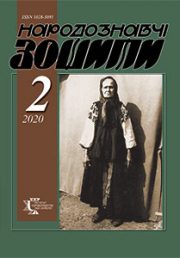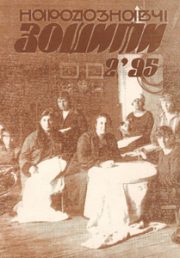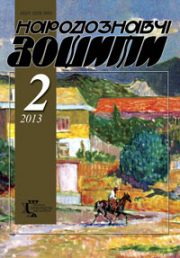The Ethnology Notebooks. 2022. № 2 (164), 473—479
UDK 930.2:[008:[325.3:321.74(47+57)]](477.83-25)” 1939/1991″
DOI https://doi.org/10.15407/nz2022.02.473
METHODOLOGICAL RESEARCH OF STUDY OF LVIV‘S CULTURAL HERITAGE OF SOVIET TIMES
HODOVANSKA Oksana
- ORCID ID: https://orcid.org/0000-0002-8297-2414
- Candidate of Historical Sciences,
- Senior research fellow,
- Institute of Ethnology of the National Academy of Sciences of Ukraine,
- Department of Social Anthropology,
- 15, Svobody Avenue, 79000, Lviv, Ukraine,
- Department of the history of Ukraine,
- museum studies and cultural heritage,
- Lviv Polytechnic National University,
- 12, Bandera street, 79013, Lviv, Ukraine,
- Contacts: e-mail: oksana.m.hodovanska@lpnu.ua
Abstract. The purpose of the proposed article is to clarify the set of ways to study the cultural heritage of the city of Lviv in Soviet times. The following tasks are set for its implementation — a description of methodological concepts and analysis of their limitations and absoluteness in the study of cultural heritage.
Territorial boundaries and chronological framework were delineated by the city of Lviv from 1939 to 1991. In-depth interest in the cultural heritage of the Soviet-era city involves consideration of various methods and methodological approaches. A crucial role in studying the historical and cultural heritage of the city of Lviv occupies the postcolonial paradigm, which can be an attempt to implement the leading value, removing antagonisms, reconciling former antagonists, and building relationships free from domination between national communities.
During the study of the Soviet cultural heritage of the city, it is appropriate to take into consideration the idea of the «humanistic coefficient». It emphasizes that all social facts are always related to human activities, and the facts are «someone’s but not nobody’s», placed in the life experiences of individuals or communities who encounter them, notice them, register, experience, interpret, evaluate. Social studies of the concept of culture and the concept of acculturation reveal new perspectives in the study of the cultural heritage of Soviet Lviv.
The cultural identity of the citizens of Soviet Lviv was created by the imposition of various cultural influences under which they were. These cultural impacts could act in one direction and mutually reinforce, forming a monolithic, complete and unconditional identification with culture. As well as various cultural influences in fact could be inconsistent, leading to cultural dissonance, and as a result to the integrity lacks, «cracked» cultural identity. The concept of authority, which belongs to the French philosopher Michel Foucault, and with his understanding of discursive power, is another tool for analyzing the cultural heritage of Soviet Lviv. Horizontality, decentralization, invisibility are the reference features of discursive powers, implemented through the mechanisms (supervision, normalization, and discipline) of the Soviet cultural code.
Keywords: postcolonialism, acculturation, cultural heritage, discursive authorities, Lviv, Soviet times.
Received 1.04.2022
REFERENCES
- Ryabchikova, F. (2012). Museum work in the Western Ukrainian ethnic lands in 1939—1941. The Volyn Museum Bulletin: Museums in the study and preservation of cultural heritage of Western Ukrainian ethnic lands, 4, 12—18. Retrieved from: http://volyn-kray-mus.at.ua/publ/muzejnictvo_na_zakhidnoukrajinskikh_etnichnikh_zemljakh_u_1939_1941_rr/1-1-0-86 (Last accessed: 03.02.2022) [in Ukrainian].
- Mankovskaya, R. (2011). Destruction of museum collections in the Ukrainian SSR in the postwar period (second half of the 1940s—1950s). History of Ukraine: little-known names, events, facts, 37, 198—214. Retrieved from: http://history.org.ua/JournALL/histname/histname_2011_37/13.pdf (Last accessed: 03.02.2022) [in Ukrainian].
- Mankovskaya, R., & Zhilenkova, I. (2018). Deformation Process in Museum Activity: Western Ukrainian Regions in 1939—1950-ies. Kraieznavstvo, 2, 60—75. Retrieved from: https://chtyvo.org.ua/authors/Mankovska_Ruslana/Deformatsiini_protsesy_v_muzeinytstvi_zakhidnoukrainski_oblasti_v_1939_1950-kh_rr/ (Last accessed: 03.02.2022) [in Ukrainian].
- Badyak, V. (2011). The cultural heritage of Poles in Lviv in the monument protection activities of the soviet authorities in the postwar years. Proceedings of the Center for Monument Studies, 19, 40—56. Retrieved from: http://dspace.nbuv.gov.ua/bitstream/handle/123456789/80201/05-Badyak.pdf?sequence=1 (Last accessed: 03.02.2022) [in Ukrainian].
- Krupnyk, L. (2009). Museums of the Ukrainian SSR as a means of soviet ideological policy in the 70s of the XX century. The Scientific notes, 19 (2), 382—393. Retrieved from: https://shron1.chtyvo.org.ua/Krupnyk_Liubov/Muzei_URSR_iak_zasoby_radianskoi_ideolohichnoi_polityky_u_70-ti_roky_XX_st.pdf? (Last accessed: 03.02.2022) [in Ukrainian].
- Bozhko, N., & Tsubov, L. (2019). Preservation and use of architectural monuments in Western Ukraine in the era of totalitarianism (II half of the ХХ century.). Historical and Cultural Studies, 6 (1), 19—24. Retrieved from: https://science.lpnu.ua/uk/hcs/vsi-vypusky/vypusk-6-nomer-1-2019/zberezhennya-ta-vykorystannya-pamyatok-arhitektury-na (Last accessed: 03.02.2022) [in Ukrainian].
- Law of Ukraine on the Protection of Cultural Heritage. Retrieved from: https://zakon.rada.gov.ua/laws/show/1805-14#Text (Last accessed: 03.02.2022) [in Ukrainian].
- Hundorova, T. (2014). Henerational challenge and postcolonialism in Eastern Europe. In Hundorova, T., Matusyak, A. (Eds.). Postcolonialism. Henerations. Culture. Kyiv: Laurus. Retrieved from: http://uamoderna.com/images/biblioteka/Postcolonialism.pdf (Last accessed: 03.02.2022) [in Ukrainian].
- Hundorova, T. (2014). Postcolonial novel of henerational trauma and postcolonial reading in Eastern Europe. In Hundorova, T., Matusyak, A. (Eds.). Postcolonialism. Henerations. Culture. Kyiv: Laurus. Retrieved from: http://uamoderna.com/images/biblioteka/Postcolonialism.pdf (Last accessed: 03.02.2022) [in Ukrainian].
- Pavlyshyn, M. (2014). Postcolonialism as a method and composition of thought. Observations on Ukrainian literary studies on the pages of «Slovo and Chas» magazine in 1991—2011. In Hundorova, T., Matusyak, A. (Eds.). Postcolonialism. Henerations. Culture. Kyiv: Laurus. Retrieved from: http://uamoderna.com/images/biblioteka/Postcolonialism.pdf (Last accessed: 03.02.2022) [in Ukrainian].
- Pavlyshyn, M. (2014). On the benefits and harms of postcolonialism for life. The Universe, 3—4 (1023—1024), 229—240. Retrieved from: https://chtyvo.org.ua/authors/Marko_Pavlyshyn/Pro_koryst_i_shkodu_postkolonializmu_dlia_zhyttia/ (Last accessed: 26.02.2022) [in Ukrainian].
- Shtompka, Pjotr. (2020). Sociology. Analysis of society. Lviv: Kolir PRO [in Ukrainian].
- Hyrych, J. (2008). Cities of Soviet Ukraine 50—60’s of the ХХ century as a historical phenomenon. Ethnic history of the peoples of Europe, 26, 144—149. Retrieved from: //http://ethnic.history.univ.kiev.ua/data/2008/26/articles/19.pdf (Last accessed: 26.02.2022) [in Ukrainian].
- Deliege, Robert. (2008). Essays on the history of anthropology. Schools. Authors. Theories. Kyiv: Kyiv-Mohyla Academy [in Ukrainian].
- Maerchyk, Maria, Plakhotnik, Olga, & Halyna, Yarmanova. (2013). Gender for the media. A textbook on gender theory for journalists and other socio-humanitarian specialties. Kyiv: Krytyka [in Ukrainian].
- Pavlychko, S. (2002.) Feminism as a possible approach to the analysis of Ukrainian culture. In Pavlychko, S. (Ed.). Feminism. Kyiv: Solomiya Pavlychko Publishing House «Osnovy». Retrieved from: https://shron1.chtyvo.org.ua/Pavlychko_Solomiia/Feminizm_zbirka.pdf? (Last accessed: 26.02.2022) [in Ukrainian].






